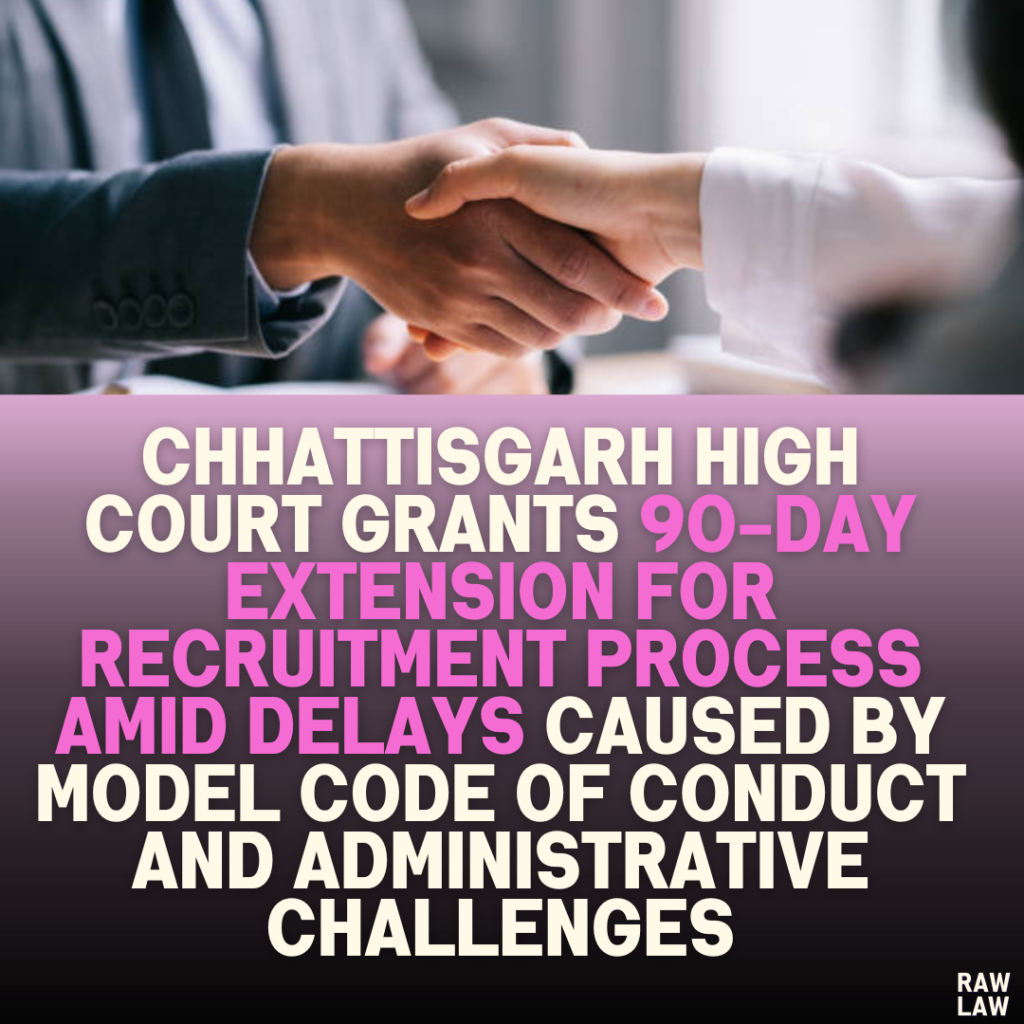Court’s Decision:
The Chhattisgarh High Court granted a 90-day extension to the Chhattisgarh State Minor Forest Produce (Trading and Development) Cooperative Federation to conclude its recruitment process, as per its earlier order in Writ Petition (S) No. 1159 of 2024. The court stated, “Considering the facts and circumstances of the case and the submissions made by the parties at bar, this Court is inclined to grant further 90 days’ time to complete the recruitment process.”
Facts:
- The applicant, Chhattisgarh State Minor Forest Produce (Trading and Development) Cooperative Federation, sought additional time to conclude a recruitment process that had been delayed due to the enforcement of the model code of conduct.
- In an earlier writ petition (Writ Petition (S) No. 1159 of 2024), the court directed the applicant to complete the recruitment process within 90 days of the receipt of the court’s order dated August 12, 2024.
- The applicant claimed that it had initiated the recruitment process but required further time for completion.
- Respondents had previously filed the writ petition requesting the conclusion of the recruitment process, which the court had resolved by expecting the applicant to act expeditiously.
Issues:
- Whether the applicant should be granted an extension to complete the recruitment process, initially ordered to be concluded within 90 days.
- Whether 90 additional days is a reasonable duration for compliance, as suggested by the applicant, or if a shorter duration, as suggested by the respondent, would suffice.
Petitioner’s Arguments:
- The applicant argued that they had taken steps to comply with the court’s directive, and the recruitment process was already underway.
- Additional time of 90 days was necessary due to procedural and administrative delays caused earlier by the imposition of the model code of conduct.
- The delay was not intentional but resulted from external factors beyond the applicant’s control.
Respondent’s Arguments:
- The respondents did not oppose the request for an extension but suggested that 60 days would be adequate to conclude the process.
- They emphasized that the recruitment process should not be unnecessarily prolonged, as it affected individuals awaiting appointments.
Analysis of the Law:
- The High Court considered its directive in Writ Petition (S) No. 1159 of 2024, where it had ordered the recruitment process to be concluded within a “reasonable period of time” and set a 90-day limit.
- The model code of conduct, a statutory framework restricting administrative actions during elections, was the primary reason for the earlier delay.
- The law provides for judicial discretion to extend deadlines in cases where compliance is delayed due to genuine procedural difficulties.
Precedent Analysis:
The court referenced its previous order in the same matter (Writ Petition (S) No. 1159 of 2024), which acknowledged the importance of concluding the recruitment process promptly once external impediments, like the model code of conduct, were removed. By granting a similar 90-day timeframe, the court underscored its commitment to balancing administrative efficiency with procedural fairness.
Court’s Reasoning:
- The court acknowledged the applicant’s efforts in initiating the recruitment process following its earlier order.
- It noted the respondents’ argument for a shorter duration but found that the applicant’s request for 90 days was reasonable, considering the nature and scope of the recruitment process.
- The court balanced the need for expeditious compliance with the practicalities of administrative procedures, ultimately favoring a reasonable extension to ensure thorough and lawful execution of the recruitment process.
Conclusion:
The High Court allowed the applicant an additional 90 days from the date of the current order (December 9, 2024) to conclude the recruitment process. This extension was granted with the expectation that the applicant would adhere to the timeline and comply with the earlier directive without further delays.
Implications:
- The judgment emphasizes the judiciary’s understanding of administrative constraints while maintaining accountability for compliance with its orders.
- The decision reflects the court’s focus on procedural fairness and its commitment to resolving delays caused by external factors like the model code of conduct.
- It sends a message to administrative bodies about the importance of adhering to judicial timelines while recognizing practical challenges.




Pingback: Delhi High Court Directs Formation of Special Task Force to Oversee Taimoor Nagar Drain Desilting and Maintenance: “Accountability and Timely Execution Are Paramount in Preventing Encroachments and Flooding” - Raw Law
Pingback: Supreme Court Upholds Divorce on Grounds of Mental Cruelty and Desertion: “False Complaints and 15-Year Separation Prove Irretrievable Breakdown of Marriage; ₹1 Crore Awarded for Alimony and Child’s Future” - Raw Law